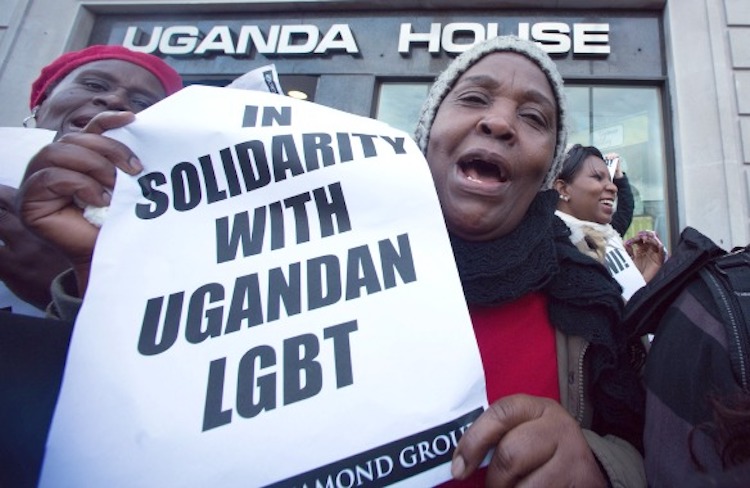By Lisa Vives, Global Information Network
NEW YORK, 27 March 2023 (IDN) — In defiance of the United Nations, the U.S. and other world government and human rights organizations, the Ugandan parliament has passed a bill imposing the most severe penalties against its gay community – criminalizing lesbians, gays and bisexuals for simply existing.
Ugandan Members of Parliament tightened up the original text, which provided for up to 10 years in prison for anyone engaging in homosexual acts or claiming to be LGBTQ+.
“The passage of this discriminatory text -probably the worst of its kind in the world– is a deeply troubling development,” said the UN High Commissioner for Human Rights, Volker Turk, in a statement.
“Let us be clear: this is not about ‘values.’ Promoting violence and discrimination against people for who they are and who they love is wrong and any disingenuous attempts to justify this on the basis of ‘values’ should be called out and condemned.”
“There are no words to describe the feeling of being persecuted by everyone around you, just for being yourself, for being who you are,” Atuhaire, a Kampala-based member of Uganda’s LGBTQ community told ABC News, using only his first name for personal safety.
“When we leave work every day our colleagues have a safe place to go home to. We no longer have even that luxury. As we speak, I am facing eviction.”
The bill also impacts landlords and property owners who face penalties or imprisonment if their premises are used for “homosexual acts.”
Parliamentary Speaker Anita Annet announced the bill’s passing—283 to 389—to cheers and applause.
Museveni, meanwhile, has vowed not to bend to western pressure.
“Western countries should stop wasting the time of humanity by trying to impose their practices on other people,” he said earlier this month.
Other African countries with harsh anti-gay laws include: Algeria, Burundi, Cameroon, Eritrea, Ethiopia, Ghana, Kenya, Lesotho, Libya, Liberia, Malawi, Mauritania, Morocco, Namibia, Mauritius, Nigeria, Senegal, Sierra Leone, Somalia, South Sudan, Sudan, Eswatini, Tanzania, Tunisia, Uganda, Zambia, and Zimbabwe.
The U.S. has financial muscle if it chooses – it now pays Uganda’s annual assistance budget exceeding $950 million as well as health assistance through PEPFAR.
Meanwhile, as an anti-gay bill draws more criticism, it also draws attention further away from another unpopular bill—namely a bill approving a controversial pipeline that threatens to destroy “one of our greatest heritages,” says Ben Ntale, a Ugandan tour guide who has been bringing visitors to the Murchison Falls National Park for two decades.
Roaring bulldozers and excavators are already toppling ancient trees and carving roads to reach Uganda’s newest source of riches: oil, writes Abdi Latif Dahir in a major New York Times expose.
Uganda, a verdant, landlocked country in East Africa has signed onto a multibillion-dollar joint venture with French and Chinese oil companies, claiming that the revenues will fund schools, roads and other development, says Dahir.
Drilling has already begun on the shores of Lake Albert, and in the pristine habitat of Murchison Falls National Park, workers are clearing areas to lay pads for oil wells. Land is being acquired and cleared to build the pipeline to carry the oil from the lush side of landlocked Uganda, through forests and game reserves in Tanzania, to a port on the Indian Ocean coast.
Residents in both countries have been displaced from their lands, drawing international criticism and lawsuits. Environmentalists are alarmed that oil spills could threaten Lake Victoria, a vital source of freshwater for 40 million people, and ravage the park that protects Murchison Falls, one of the world’s most powerful waterfalls, where the Nile River roars through a narrow gorge.
The East African Crude Oil Pipeline (EACOP) threatens towns and villages having all or part of their land expropriated. Many are still waiting for payment years later, while the pipeline company forbids them from planting vital cash crops like bananas, which pay for food and school fees for their children.
“They are only thinking of the outsiders who will buy their oil, not us who own the land,” said Sarah Natukunda, a 39-year-old mother of five in Kijumba, a village in western Uganda. She waited years before she was paid for her land. By then, the sum was too small to buy similar property nearby where land prices had appreciated in value, she said, and the pipeline company refused to raise its price.
Fishing communities as well as farmers are being displaced. On the shores of Lake Albert, a newly installed oil rig pierced the sky. China National Offshore Oil Corporation began initial drilling for oil there in January.
Ugandan climate activist challenged the bill: “There is a huge appetite here for clean energy alternatives,” she says. “I have seen it through my work to install solar panels and clean stoves in rural schools.
“These efforts sometimes feel hopeless when money floods in from foreign banks and governments for fossil fuels. But Africa is where critical investments should go in our fight for a stable climate in the coming years. Financial institutions must reject the East African Crude Oil Pipeline and fossil fuel projects like it, in favor of clean energy. The science is clear. So is the case for investment.” [IDN-InDepthNews]
Photo source: Global Information Network
Visit us on Facebook and Twitter.
IDN is the flagship agency of the Non-profit International Press Syndicate.
We believe in the free flow of information. Republish our articles for free, online or in print, under Creative Commons Attribution 4.0 International, except for republished articles with permission.

